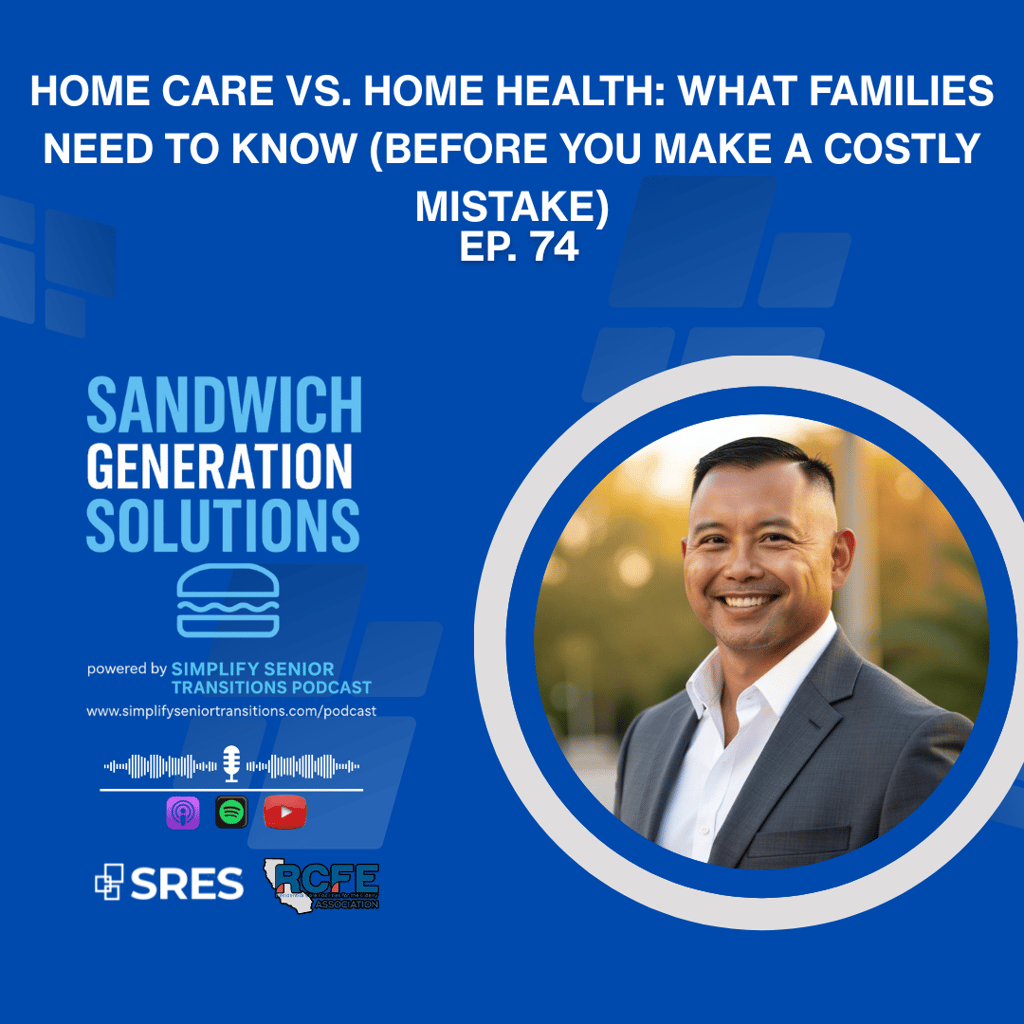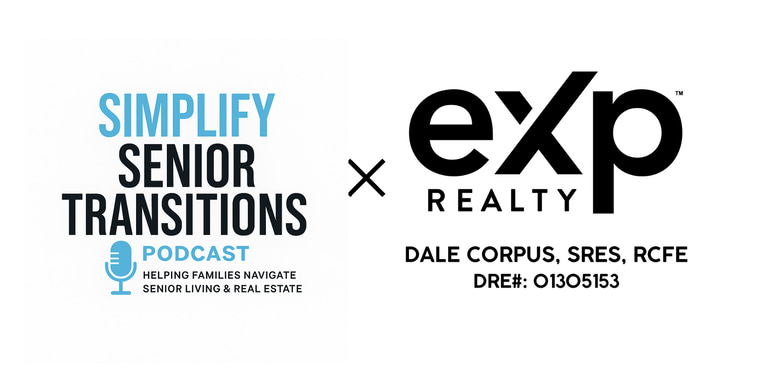Confusion Solved: The Real Difference Between Home Care and Home Health
A must-read guide for Bay Area families balancing senior care, explaining how to choose the right support, avoid costly mistakes, and prevent caregiver burnout.
Dale Corpus
9/25/20254 min read
Confusion Solved: Home Care vs. Home Health—What Bay Area Families Must Know
If you’re an adult child caring for an aging parent in the San Francisco Bay Area—whether you’re in Contra Costa, Alameda, Santa Clara, San Mateo, San Francisco, Solano, or Napa county—you know the stress is real. You're likely juggling work, family life, and the overwhelming task of finding the right support for your loved one.
Confusion over care options can add unnecessary stress, wasted time, and even risk.
Hi, I’m Dale Corpus, a senior transition specialist and real estate expert based right here in the San Francisco Bay Area. This is an episode recap from Sandwich Generation Solutions, powered by the Simplify Senior Transitions Podcast, where we share expert insights and practical tips to make planning easier for families like yours.
Today, we’re tackling one of the most common and costly mistakes families make: confusing home care with home health.
Here's What You'll Learn in This Episode
This episode provides clarity on the critical difference between Home Care (non-medical, daily support) and Home Health (medical, short-term recovery).
We use real-life examples to show how confusing these terms can delay the support your loved one needs. You’ll learn how to:
Assess whether the need is medical (rehab, therapy) or non-medical (bathing, meals).
Discover creative financial options, including real estate solutions, to cover the costs of ongoing care.
Understand why adding support early is key to preventing caregiver fatigue and burnout.
The Critical Mix-Up: A Story from San Jose
The distinction between these two terms is crucial. Just look at the experience of the Ramirez family from San Jose.
When their mother, Elena, needed more help, her doctor suggested “home health.” They assumed this meant daily caregivers would arrive to help with bathing, meals, and companionship.
The reality hit hard: When the home health nurse arrived, she explained her role was limited to checking vitals, changing wound dressings, and reviewing medications. She was not there every day, and she definitely couldn't cook or help with personal care.
The Ramirezes realized they actually needed home care, not home health. Weeks were lost, and Elena went without the daily support she required. This scenario is incredibly common across the Bay Area.
Home Care vs. Home Health: A Clear Breakdown
These two types of support are important, but they serve completely different needs.
🏡 Home Care (Non-Medical Support)
What it is: Non-medical support focusing on the daily activities of living.
Examples: Bathing and grooming, dressing, meal preparation, light housekeeping, companionship, and transportation to appointments.
The Goal: Comfort, safety, and daily living. Home care workers (caregivers, companions, or aides) are the lifeline that keeps someone aging safely in place, particularly for families in Contra Costa, Alameda, and Santa Clara counties.
Payment & Duration: Usually paid out of pocket or through long-term care insurance. Schedules are flexible, ranging from a few hours a week up to 24/7 live-in support.
🏥 Home Health (Medical Support)
What it is: Skilled medical care at home, ordered by a doctor.
Examples: Skilled nursing visits, physical/occupational/speech therapy, wound care, medication management, and vital sign checks.
The Goal: Rehab, treatment, and recovery after a hospitalization or medical event.
Payment & Duration: Typically covered by Medicare or insurance. Crucially, it is short-term and limited to a few visits a week—it is not designed for ongoing, round-the-clock help.
👉 The two can absolutely complement each other. For instance, a father in Walnut Creek needed Home Health for post-hip surgery recovery, while his family layered in Home Care for six hours a day to assist with safe showering and meals between medical visits.
Planning, Paying, and Managing Stress
When facing the transition to senior living or bringing in support, the decision framework is simple:
Medical vs. Non-Medical: If the main issue is rehab or wound care, that’s Home Health. If it’s daily living, meals, or companionship, that’s Home Care.
Short-term vs. Long-term: Short-term recovery is Home Health; long-term support is Home Care.
Coverage: Medicare covers skilled home health for a short period, but generally not ongoing personal care. Home care typically requires private pay.
For families across Contra Costa, Alameda, Santa Clara, and San Mateo counties, I recommend starting by asking the doctor what is medically necessary to see if Home Health is appropriate. Then, immediately assess the daily life gaps—hygiene, meals, safety—and add Home Care if needed.
💡 Don’t wait until burnout hits. Caregiver fatigue is a real challenge, and layering support early prevents a crisis.
If affording long-term daily help (Home Care) is a concern, remember that not only wealthy families can afford it. Some families use long-term care insurance or veterans benefits. Many also utilize creative real estate solutions, like selling or renting their loved one's home, to help pay for necessary ongoing care.
This financial strategy often goes hand-in-hand with navigating challenges like downsizing and preparing the senior's home for sale.
Final Thoughts
If your loved one is considering senior living and you need guidance on managing their home transition—from choosing care options to maximizing the value of the home sale—let’s talk.
📞 Schedule a FREE consultation and learn more about my services at www.simplifyseniortransitions.com.
🎧 You can also listen to the full Simplify Senior Transitions Podcast episode on YouTube, Spotify, Apple Podcasts, and all major platforms.
📲 Have a quick question? DM me directly on Instagram @soldbydale.
P.S. Got news or an amazing story to share? Hit us up at dale.corpus@exprealty.com and you might be featured in our next episode! Remember, always check out the transcript for detailed insights.
Happy listening!
Watch The Podcast Here



Transitions Made Simple
Helping seniors transition with ease and peace.
📍 Serving the San Francisco Bay Area
📞 GET IN TOUCH
📬 STAY INFORMED
Dale Corpus, SRES, RCFE
📱 925-380-1657
📧 dale@simplifyseniortransitions.com
🕓 Available for free 15 min consultations by appointment
© 2026. All rights reserved.
Sign up for monthly senior transition tips & real estate insights.
